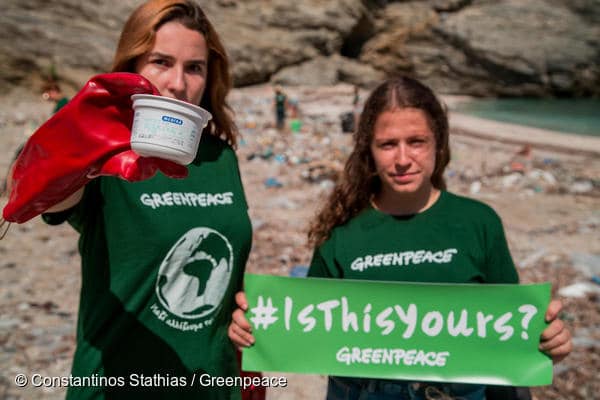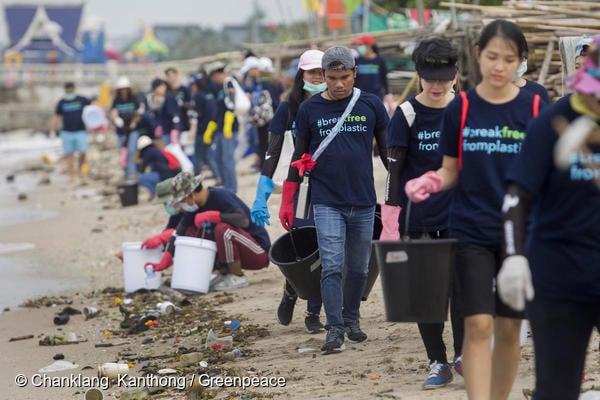Marine Life & Conservation
Coca-Cola, PepsiCo and Nestlé found to be worst plastic polluters worldwide in global cleanups and brand audits
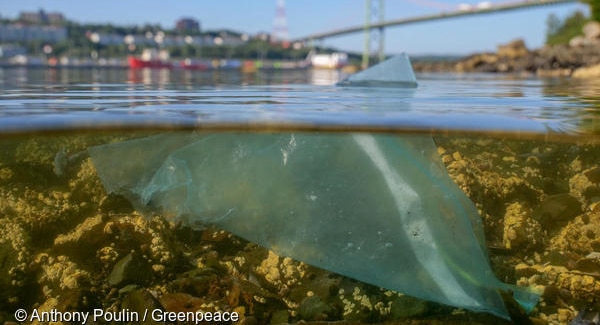
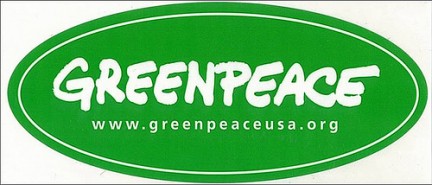 Coca-Cola, PepsiCo and Nestlé were the most frequent companies identified in 239 cleanups and brand audits spanning 42 countries and six continents, the Break Free From Plastic movement has announced.
Coca-Cola, PepsiCo and Nestlé were the most frequent companies identified in 239 cleanups and brand audits spanning 42 countries and six continents, the Break Free From Plastic movement has announced.
Over 187,000 pieces of plastic trash were audited, identifying thousands of brands whose packaging relies on the single-use plastics that pollute our oceans and waterways globally. Coca-Cola was the top polluter in the global audit, with Coke-branded plastic pollution found in 40 of the 42 participating countries. This brand audit effort is the most comprehensive snapshot of the worst plastic polluting companies around the world.
In the U.S., across 70 total cleanups, 907 volunteers identified Nestlé, PepsiCo, and Coca-Cola as the worst corporate polluters, in that order.
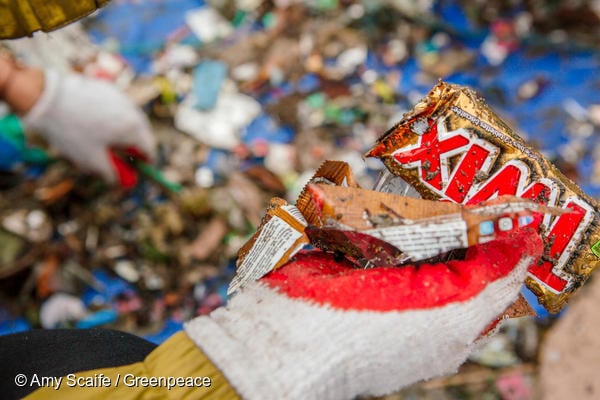
For World Clean-up Day, Greenpeace alongside community allies, volunteers, and a Greenpeace local group coordinate a clean-up activity and plastic polluter brand audit. The audit seeks to identify the major corporate contributors to plastic waste polluting shorelines, green spaces and communities.
“These brand audits offer undeniable proof of the role that corporations play in perpetuating the global plastic pollution crisis,” said Global Coordinator of Break Free From Plastic Von Hernandez. “By continuing to churn out problematic and unrecyclable throwaway plastic packaging for their products, these companies are guilty of trashing the planet on a massive scale. It’s time they own up and stop shifting the blame to citizens for their wasteful and polluting products.”
The audits, led by Break Free From Plastic member organizations, found that Coca-Cola, PepsiCo, Nestlé, Danone, Mondelez International, Procter & Gamble, Unilever, Perfetti van Melle, Mars Incorporated, and Colgate-Palmolive were the most frequent multinational brands collected in cleanups, in that order. This ranking of multinational companies included only brands that were found in at least ten of the 42 participating countries. Overall, polystyrene, which is not recyclable in most locations, was the most common type of plastic found, followed closely by PET, a material used in bottles, containers, and other packaging.
The top polluters in Asia, according to the analysis, were Coca-Cola, Perfetti van Melle, and Mondelez International brands. These brands accounted for 30 percent of all branded plastic pollution counted by volunteers across Asia. This year’s brand audits throughout Asia build upon a week-long cleanup and audit at the Philippines’ Freedom Island in 2017, which found Nestlé and Unilever to be the top polluters.
“We pay the price for multinational companies’ reliance on cheap throwaway plastic,” said Greenpeace Southeast Asia – Philippines Campaigner Abigail Aguilar. “We are the ones forced to clean up their plastic pollution in our streets and waterways. In the Philippines, we can clean entire beaches and the next day they are just as polluted with plastics. Through brand audits, we can name some of the worst polluters and demand that they stop producing plastic to begin with.”
In North and South America, Coca-Cola, PepsiCo, and Nestlé brands were the top polluters identified, accounting for 64 and 70 percent of all the branded plastic pollution, respectively.
“In Latin America, brand audits put responsibility on the companies that produce useless plastics and the governments that allow corporations to place the burden, from extraction to disposal, in mostly vulnerable and poor communities,” said GAIA Coordinator for Latin America Magdalena Donoso. “BFFP members in Latin America are exposing this crisis and promoting zero waste strategies in connection with our communities.”
In Europe, Coca-Cola, PepsiCo, and Nestlé brands were again the top identified polluters, accounting for 45 percent of the plastic pollution found in the audits there. In Australia, 7-Eleven, Coca-Cola, and McDonald’s brands were the top polluters identified, accounting for 82 percent of the plastic pollution found. And finally, in Africa, ASAS Group, Coca-Cola, and Procter & Gamble brands were the top brands collected, accounting for 74 percent of the plastic pollution there.
“These brand audits are putting responsibility back where it belongs, with the corporations producing endless amounts of plastics that end up in the Indian Ocean,” said Griffins Ochieng, Programmes Coordinator for the Centre for Environment Justice and Development in Kenya. “We held cleanups and brand audits in two locations in Kenya to identify the worst corporate polluters in the region and hold them accountable. It is more urgent than ever, for the sake of communities that rely on the ocean for their livelihoods, health and well-being, to break free from plastic.”
Break Free From Plastic is calling on corporations to reduce their use of single-use plastic, redesign delivery systems to minimize or eliminate packaging, and take responsibility for the plastic pollution they are pumping into already strained waste management systems and the environment. While the brand audits do not provide a complete picture of companies’ plastic pollution footprints, they are the best indication to date of the worst plastic polluters globally.
For more information on Break Free From Plastic visit their website by clicking here.
For more information on Greenpeace visit their website by clicking here.
Marine Life & Conservation
Paul Watson Released as Denmark Blocks Japan’s Extradition Bid

Renowned anti-whaling activist Paul Watson has been released from custody in Greenland after spending five months in detention. Denmark’s Justice Ministry rejected Japan’s request for his extradition, citing insufficient guarantees that his time already served in custody would be credited against any potential sentence.
The 74-year-old Canadian-American was arrested on July 21 in Nuuk, Greenland’s capital, when his ship docked to refuel. His arrest was based on a 2012 Japanese warrant related to a 2010 encounter in Antarctic waters. Japan alleged Watson obstructed operations and caused damage to a whaling research ship during efforts to disrupt illegal whaling. Watson has consistently denied these claims, maintaining his commitment to marine conservation.
Denmark, which oversees extradition matters for Greenland, concluded that while the legal conditions for extradition were met, the lack of assurances from Japan regarding time-served credit made extradition untenable.
In a video shared by his foundation, Watson expressed gratitude and relief, saying, “After five months, it’s good to be out… and good to know they’re not sending me to Japan.” He added that the most difficult part of his time in custody was being separated from his two young sons.
Watson is a pioneering figure in marine conservation, known for founding the Captain Paul Watson Foundation in 2022 after decades of activism with the Sea Shepherd Conservation Society. His bold efforts to defend marine life have earned him widespread support, including from celebrities and conservationists. His work has also been featured in the acclaimed reality TV series Whale Wars.
Watson’s lawyer, Jonas Christoffersen, praised the decision, stating, “We are happy and relieved that Paul Watson is now free.” He added that Watson is eager to reunite with his family and continue his vital work.
The arrest occurred while Watson’s vessel, the M/Y John Paul DeJoria, was en route to the North Pacific with a team of 26 volunteers to intercept a Japanese whaling ship. His foundation described the arrest as politically motivated and emphasized that Watson’s actions were focused on ending illegal whaling practices.
Japan resumed commercial whaling in 2019 after leaving the International Whaling Commission, asserting that whale meat is a cultural tradition. Conservationists, however, continue to challenge these practices, highlighting their impact on marine ecosystems.
Despite the challenges, Watson remains steadfast in his mission to protect marine life and bring attention to whaling practices. His dedication to ocean conservation has made him a globally respected advocate for the environment.
Marine Life & Conservation
12 Days of Zero-Waste Fish-mas

This holiday period, the Marine Conservation Society, the UK’s leading ocean membership charity, invites you to make some simple changes to eating fish this Christmas to help our seas.
Dr Kenneth Bodles, Head of Fisheries and Aquaculture at the Marine Conservation Society, said, “During the festive season, our consumption increases, but so does waste. Sustainability isn’t just about where food comes from – it’s also about how you use it. By reducing waste and making the most out of your seafood, you’re not only taking steps to be more ocean-friendly, but can also help to cut costs during what is often one of the most expensive times of the year”.
The Marine Conservation Society has compiled twelve tips on how to consume seafood sustainably with zero-waste this Christmas:
Buy whole fish instead of fillets
Instead of fillets, consider buying whole fish such as salmon, hake, or lemon sole. By adopting a “nose to tail” approach with cooking, whole-baked fish not only feeds a crowd, but also helps to minimise waste and maximise sustainability by using up every part of the animal, including bones, skin, and fat.
Make fish stock
Leftover fish bones or shells can be put to good use by boiling them to make a nourishing fish stock or bisque. This can be frozen and preserved for later use and makes for a flavourful base in a soup.
Make your own fish pâté
Avoid waste by turning leftover fish, such as smoked mackerel or salmon, into a delicious pâté by blending with cream cheese and lemon. Perfect when paired with crackers.
The sustainability of salmon and mackerel varies depending on where and how it is caught or farmed. For more information on green-rated options, check the charity’s Good Fish Guide.
Buy frozen
By purchasing seafood that is frozen or vacuum-packed, this helps to reduce waste by extending the shelf life of your food.
Fish pie
If you’re wondering what to do with leftover cooked fish, why not opt for a classic fish pie with mashed potatoes, leeks, and a cheesy sauce? A sure crowd pleaser on Boxing Day.
Use the head
Don’t forget the fish head! The meat is incredibly tender and flavourful. The charity recommends a cod’s head curry or recreating Fallow’s renowned cod’s head in siracha butter.
By stretching your ingredients further, not only is this a more sustainable way to enjoy seafood, but also cost-effective by repurposing leftovers and cooking creatively.
Boxing Day brunch
Mix leftover kippers or smoked salmon with scrambled eggs for a tasty, zero-waste, Boxing Day brunch.
For best choice, make sure you buy kippers, or herring, from the North Sea and the North Irish Sea.
Zero-waste storage
A top tip from the Marine Conservation Society to avoid waste is freezing fish offcuts to save for future use.
Crisp up the skin
Even leftover fish skin can be turned into a quick savoury snack by crisping it up in an air fryer with a little olive oil and salt.
Anchovies two ways
Leftover anchovies can either be blended with butter to make a delicious anchovy butter or tossed into pasta for a hit of umami flavour.
The charity recommends opting for anchovies caught in the Bay of Biscay for best choice.
Fishcakes
For an easy, zero-waste meal, leftover seafood trimmings can be mixed with mash and fried in breadcrumbs to make fishcakes.
Pickled mussels
Try pickling mussels in 1:1 vinegar and water, with a dash of sugar for a sustainable, zero-waste snack that can be enjoyed well beyond the festive season.
Mussels farmed in the UK are a seafood superhero. Grown using low-impact methods and harvested by hand, they get all the food they need from the sea around them. This makes them one of the most sustainable, ocean-friendly, and cost-effective seafood options.
Players of People’s Postcode Lottery have raised £6.6M towards the Marine Conservation Society’s vital work in making seafood more sustainable.
Laura Chow, Head of Charities at People’s Postcode Lottery, said: “Fish is a festive favourite for many, but making sustainable choices when it comes to how we buy and eat seafood makes all the difference for our ocean. Support from players of People’s Postcode Lottery has helped the Marine Conservation Society further its sustainable seafood work, so that we can all enjoy healthier, better protected seas.”
The Marine Conservation Society encourages you to make sustainable seafood choices a year-round habit, not just for Christmas. To check how sustainable the seafood on your plate is, you can visit the charity’s Good Fish Guide. The Guide helps consumers and businesses identify the most sustainable seafood using a simple traffic light system, based on where and how species are caught or farmed. Green is the best choice, amber means improvements are needed, and red indicates fish to avoid buying.
Zero-waste gift idea
Why not embrace a zero-waste Christmas by gifting a membership to support marine conservation? It’s a meaningful, low-waste gift that helps protect our ocean for generations to come. Memberships start from as little as £5 a month – the price of a sandwich and drink from your local coffee shop.
Find the latest sustainable seafood advice for wild-caught and farmed seafood on the Good Fish Guide, downloadable to your phone from www.mcsuk.org/goodfishguide.
-

 News2 months ago
News2 months agoIconic SS United States to become the World’s Largest Artificial Reef
-

 News3 months ago
News3 months agoBook Review – 52 Assignments: Underwater Photography
-

 Gear News3 months ago
Gear News3 months agoDYNAMICNORD – New German diving brand enters the British market
-

 News3 months ago
News3 months agoExploring Cenote El Pit: A Diver’s Dream
-

 Gear News3 months ago
Gear News3 months agoTry BARE drysuits (and maybe even win one!) this Friday with Sea & Sea at North West Dive Fest
-

 Marine Life & Conservation3 months ago
Marine Life & Conservation3 months agoBook Review: Coral Triangle Cameos
-

 Blogs2 months ago
Blogs2 months agoDive the Egyptian Red Sea this Autumn with Regaldive
-

 News3 months ago
News3 months ago2024 Ocean Art Underwater Photo Competition Announced


